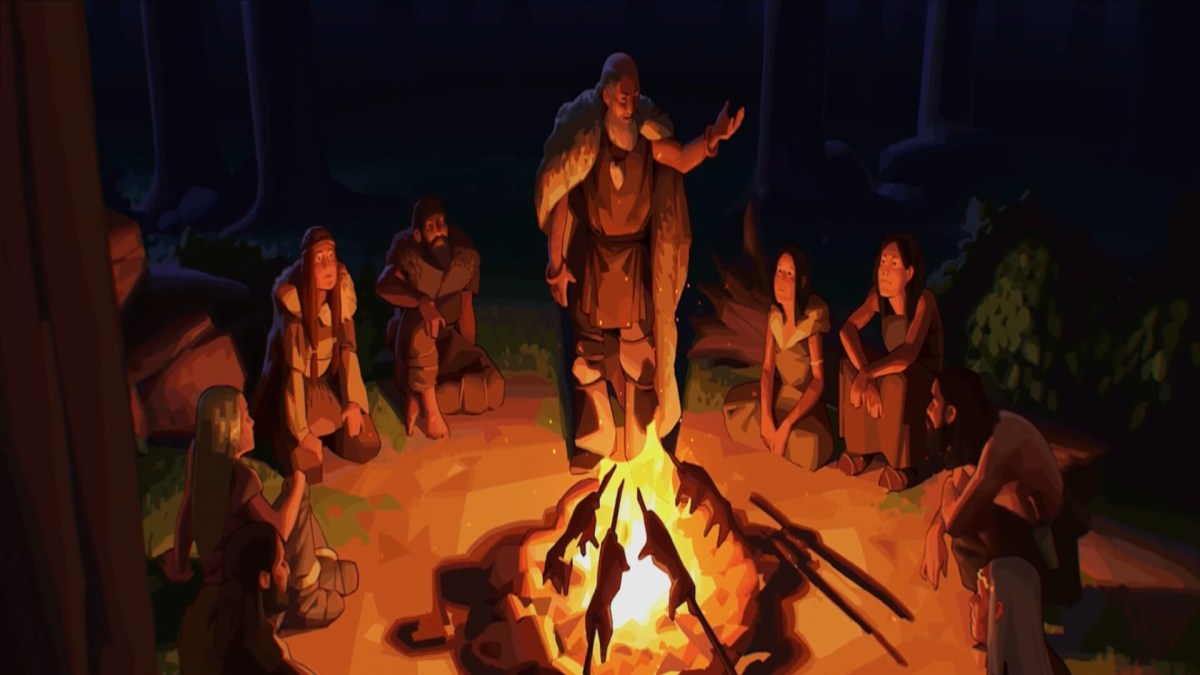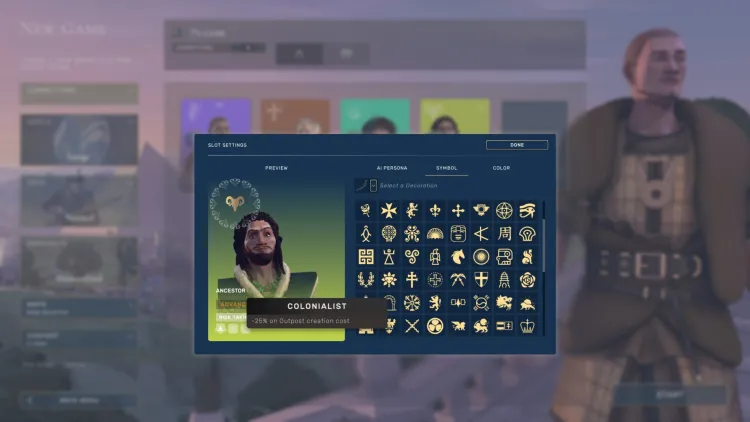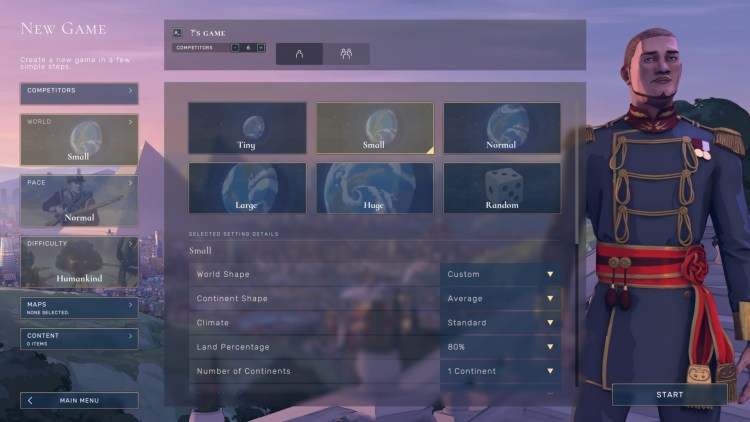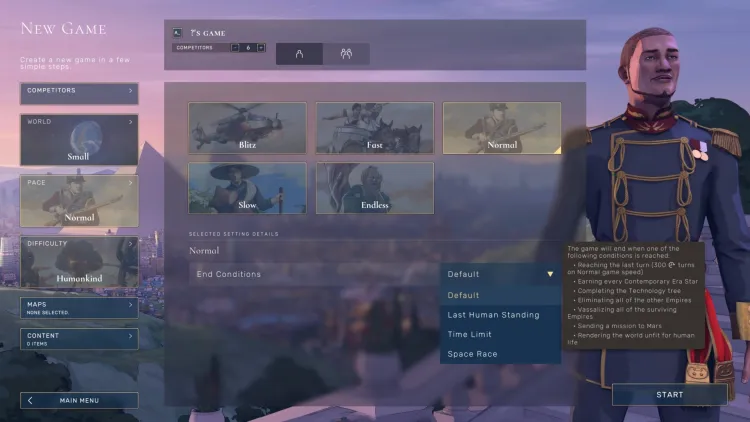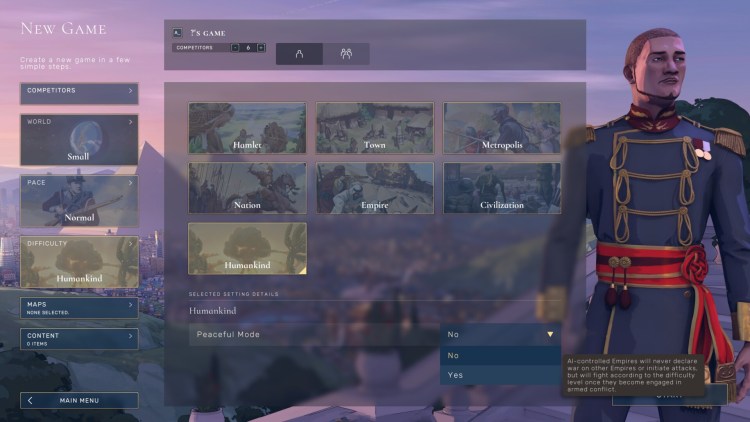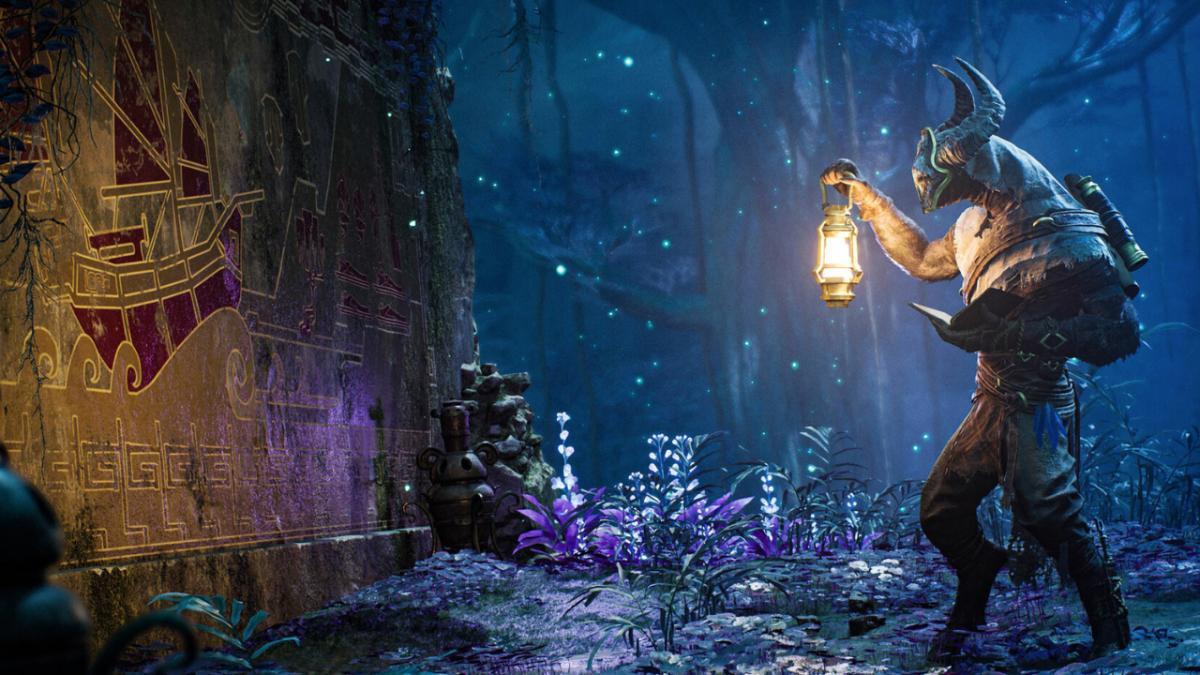Humankind has both single-player and multiplayer components. Evidently, you’ll find yourself battling the AI in a vast world that’s ripe for exploration. Of course, you’d need to look at your settings to determine the intricacies in your runs. Here’s our Humankind guide to help you start each game, understand the AI behavior of opponents, and tweak various world settings.
Note: For more information, check out our Humankind guides and features hub. You may also take a look at our beginner’s guide to learn about the basic mechanics and early-game progression.
Humankind guide: Starting your game, checking AI behavior, and world settings
Humankind allows for up to 10 competitors (you included) to duke it out on a map by clicking on “New Game.” Your AI-controlled foes are either based on mythological beings, characters from legendary epics, or historical figures. A key factor you’d want to look at is the AI Persona seen when you click on an opponent’s icon. There are archetypes that determine that AI’s behavior, as well as strengths and biases that provide them with bonuses.
Note: Some of the leaders may not be available by default. You may also unlock additional leaders by linking your Games2Gether account. This will let you share your own custom avatar and download the works of others.
AI leaders
| AI Opponent | Archetypes | Strengths | Bias |
| Agamemnon | Cruel – Productivity is important; population is more expendable. Militarist – Focuses on military power. | Pioneer – -10% outpost creation cost. Colonialist – -25% outpost creation cost. | Pilgrim – Tends to space out their outposts. |
| Ancestor | Risk-Taking – Engages all resources even if it might create holes in defenses. Adaptative – Changes tactics according to needs. | Scout – +1 movement point for all units. Colonialist – -25% outpost creation cost. | Pilgrim – Tends to space out their outposts. |
| Arjuna | Loyal – Will never betray treaties and agreements. Vindictive – Will never forget what happened in the past. | Pawnbroker – +2 money on Market Quarter. Geek – +10% science. | Avenger – Retaliates until the opponent is wiped out. |
| Beowulf | Militarist – Focuses on military power. Risk-Taking – Engages all resources even if it might create holes in defenses. | Lumberjack – +50% industry when chopping down forests. Pillager – 100% money from ransacking. | Rusher – Attacks others on sight. |
| Boudicca | Militarist – Focuses on military power. Cool-Headed – Weighs pros and cons before reacting. | Warlord – +2 combat strength for Emblematic Units. Crusader – +2 unit strength on units on territories influenced by other religions. | Avenger – Retaliates until the opponent is wiped out. |
| Edgar | Introvert – Focuses on relationships with fewer civilizations. Wary – Doubts your intentions; you’d need to do extra efforts to convince them. | Aesthete – +1 influence on Commons Quarter. Geek – +10% science. | Lover – Favors ideological positions similar to other empires. |
| Elissa | Extrovert – Eager to develop relationships with other civilizations. Hateful – Differences in ideologies and religion can be a major source of conflict. | Collectionist – -25% influence required to unlock a Cultural Wonder. Crusader – +2 unit strength on units on territories influenced by other religions. | Maritime – Develops a strong navy and coastal cities. |
| Gilgamesh | Traitorous – They will not hesitate to break treaties. Adaptative – Changes tactics according to needs. | Warrior – +1 combat strength for Emblematic Units. Grafter – +5% industry on Makers Quarter. | To The End – Will never surrender; victory is the only acceptable outcome. |
| Lucy | Impulsive – Deeds follow words. Adaptative – Changes tactics according to needs. | Patron – -25% patronage cost for Free Peoples. Master – +50% money from vassals. | Inclusive – Wants to assimilate as many Free Peoples as possible. |
| Makeda | Open – Eager to learn from others and accept diversity. Trusting – Acknowledges your efforts to build a solid relationship. | Patron – -25% patronage cost for Free Peoples. Freerider – +2 combat strength for hired units. | Inclusive – Wants to assimilate as many Free Peoples as possible. |
| Mama Ocllo | Careful – Favors a defensive playstyle. Introvert – Focuses on relationships with fewer civilizations. | Expansionist – -25% outpost attachment and city merge costs. Protector – +4 combat strength on military districts with adjacent units. | Turtle – Will create strong defenses along their borders. |
| Midas | Cool-Headed – Weighs pros and cons before reacting. Forgiving – Errors of the past stay in the past; focuses on the future. | Capitalist – +15% money. Merchant Prince – +100% income from trade routes. | Luxurious – Collects luxuries and wants control of manufacturies. |
| Mu Guiying | Loyal – Will never betray treaties and agreements. Vindictive – Will never forget what happened in the past. | Master – +50% money from vassals. Warlord – +2 combat strength for Emblematic Units. | Hipster – Favors ideological positions that are least taken by other empires. |
| Semiramis | Committed – Follows an established plan. Wary – Doubts your intentions; you’d need to do extra efforts to convince them. | Ideologist – +5 influence on Main Plaza. Artist – +2 influence on Commons Quarter. | Stubborn – Keeps their first culture for the rest of the game. |
| Tjilbruke | Benevolent – Values the happiness and freedoms of their people. Pacifist – Favors trade and negotiations over warfare. | Charmer – +50 stability on cities. Conservationist – +5 stability on forests. | Peace and Love – Wants to ally with everyone. |
| Victor | Benevolent – Values the happiness and freedoms of their people. Vindictive – Will never forget what happened in the past. | Artist – +2 influence on Commons Quarter. Collectionist – -25% influence required to unlock a Cultural Wonder. | Hipster – Favors ideological positions that are least taken by other empires. |
| Walinong Sari | Impulsive – Deeds follow words. Introvert – Focuses on relationships with fewer civilizations. | Completionist – -10% science costs for tech research. Taskmaster – -20% industry costs for Cultural Wonders. | Prideful – Systematically refuses demands. |
As you can see, archetypes and biases can affect how the AI will deal with you and the rest of the world. For instance, those who prefer a more peaceful game would probably want to select Tjilbruke as an opponent. Alternatively, both Lucy and Makeda will be nicer to you, but you can expect that they’d have advantages (i.e., strengths) when building relationships with Free Peoples (AI-controlled minor factions).
However, if you’d like to focus on warfare, you can have Beowulf and Boudicca. Both Agamemnon and Ancestor can also be dangerous opponents on higher difficulties. They’ll start building outposts everywhere, and you can find yourself locked down or facing off against a huge empire with vast domains too early. And, of course, there’s Gilgamesh. He’s not the same guy from Civilization VI who likes to buddy up with you. Instead, he’s someone who’ll betray you when you least expect it.
World settings
Next up, you can take a look at the world settings. Here, you can select the size of the map, as well as other options such as the shape of the world/continents, land percentage, abundance of rivers, ridges/cliffs, and so on. You can also toggle “world wrap” (allows you to circumnavigate the globe via a continuous map) and “new world” (any setting with additional continents or landmasses will have one continent that’s devoid of any empire’s presence).
Lastly, as mentioned in our official review, the size of the map can determine the abundance of resource nodes. Currently, there’s no separate setting that can increase the number of luxury and strategic resources on the map. As such, in smaller map sizes, you might realize that you don’t have enough strategic resources (i.e., aluminum, oil, or uranium) to acquire some endgame units or projects. This will prevent you from achieving certain end conditions unless those nodes are owned by another empire (you can trade for them or demolish your foe to take control of those nodes).
Pace settings
Under pace settings, you can select the number of turns before the game ends. This will also determine the speed of the game, especially unit recruitment and tech research. The end conditions are also here, with the default option having the following:
- Reaching the last turn (300 turns on normal speed).
- Earning all Contemporary Era stars.
- Researching all techs.
- Eliminating all other empires.
- Vassalizing all other empires.
- Sending a mission to Mars.
- Rendering the Earth unfit for human life (i.e., pollution).
Note: If you’re playing a multiplayer game, you’ll see additional options for timers (i.e., ending your turn or engaging in tactical battles).
Difficulty settings
Finally, the difficulty settings let you start things with ease, or ramp up the challenge considerably. For newcomers, I would suggest choosing “Town” difficulty to learn the ropes. Those who have more experience with the 4X strategy genre can try “Nation” or “Empire.” I’m also considering “Humankind” difficulty in future guides as this is the game’s version of “Deity” difficulty in Civilization.
Lastly, there’s”Peaceful Mode” which prevents AI leaders from declaring war or initiating attacks. However, once they’re fully engaged (i.e., you declared war on them), they’ll fight according to the difficulty level that you picked.
Humankind is available via Steam, the Epic Games Store, Stadia, and Xbox Game Pass for PC. For more information, check out our guides and features hub.

